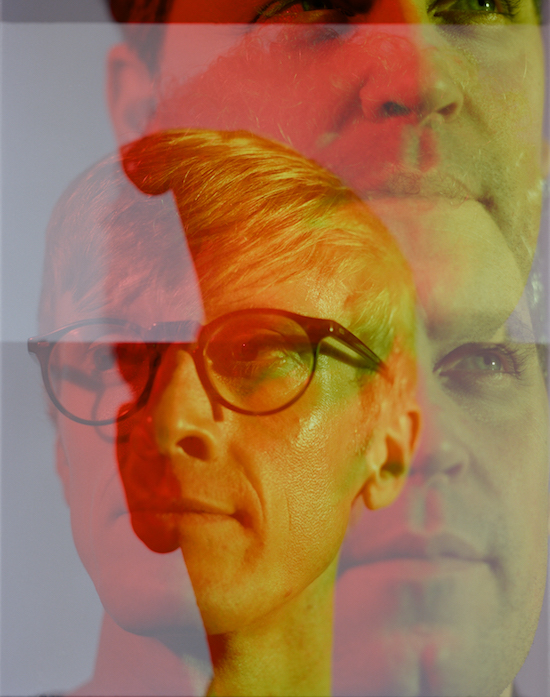Portraits by James Pearson Howe
To avoid being disingenuous, this feature should begin by addressing some bad news. About a week and a half prior to this interview taking place, Jas Shaw, one half of acclaimed electronic duo Simian Mobile Disco – the other being producer James Ford – was diagnosed with a rare disease called AL amyloidosis. AL amyloidosis is a particularly aggressive condition caused by the production of an abnormal protein called amyloid in the organs and tissue. AL amyloidosis is a rare disease with only 1,200 to 3,200 new cases being reported each year in the United States alone – it is practically unheard of in the UK.
Shaw describes the diagnosis in his own words: “I’d just got back from a tour of the US, and just going for a walk was making me get a bit more out of breath than usual. I’d noticed this before, but I had assumed it was just that I was getting old and out of shape. It was my wife who said, ‘No, let’s get this looked at.’ Almost immediately, [the hospital] did an ECG on me, and [the doctors] were like, ‘Fuck, that’s not good.’ We spent about two weeks in and out of what was sort of an A&E but for nastier conditions, trying to figure out what it was. I was very lucky that the cardiologist I had was switched on. It’s a hard thing to diagnose because a) nobody really knows about it and b) the symptoms are pretty subtle.
"It’s crazy because it just feels like yesterday that I was jumping on a plane and doing all this stuff. Ordinarily I’d hit a couple of cities, buy fifty tunes, do a couple of mixes, make a strange synth patch… it’s like someone’s flipped a switch. Treatment started almost immediately because it’s a very aggressive condition. I think the most famous person who had it was the leader of Sinn Fein, Martin McGuinness, and someone told me the time between his diagnosis and his death was about three weeks. And I was told that, left untreated, I’d have a matter of months.
"But the treatment’s been going very well. Everyone’s been so supportive, none the least James who’s basically carried us through the preparation for our Barbican show! It’s just frustrating because I’m used to getting stuff done. I have to look at it like my new job is metabolising medicine, which is tedious, but you know, I’m very lucky. If this had happened in America, and I didn’t have health insurance… or honestly in so many other places… there’s a lot to be thankful for.”
Shaw and Ford are clear that, going forward, they want to keep this situation separate from their career as musicians. Shaw says it would “poison something that’s important to me. I need [Simian Mobile Disco] to not be related to all that bullshit.” Still, Ford admits that he found their show at the Barbican – occurring only a week after Shaw’s diagnosis, and the only performance not to be cancelled in its wake – was a poignant one. “It added an extra level to the gig for me, and I’m sure it did for Jas as well, but I don’t want to play on that.”
And with this in mind we move onto a conversation about the making of their fifth studio album, Murmurations.
For this electronic duo, it’s all about the process; Shaw refers to their music, pleasantly, as a “residue of the procedure”. Their approach to making records is to arrange a new experience or setting they can experiment with. “For instance, with the album Whorl, we took our synths out to the Joshua Tree in the desert with some mushrooms, and had a great time fucking around basically.” says Ford. The manufacturing of a specific situation or idea is “what we do before we even start thinking about what the music is going to sound like.”
“I think that electronic music especially – although actually, maybe I’m backing out of this slightly – often feels like it doesn’t follow the traditional romantic idea of creation. There’s not a flash of inspiration, and it’s not a results driven thing. It’s the residue of curiosity.” explains Shaw.
“I totally agree, but I wouldn’t say that’s just with electronic music.” counters Ford. “I think any great records have that feeling about them, where they were just trying to do something exciting for themselves. It’s whatever part of the process you find interesting, whether it’s trying to play a 12-string guitar for the first time or recording birdsong and manipulating it with tape loops, there’s many different ways it can manifest itself.”
“Yeah, I agree,” says Shaw. “That’s why I was backing out!”
Within whichever creative paradigm Simian Mobile Disco create for themselves, naturally there must come a set of limitations. “Limitations are always a good thing.” says Ford. “I think that’s why the blank canvas of a laptop with everything on it is so daunting. When you design a process, you’re building in limitations, and that’s what makes you want to give something an extra turn of the screw. You’re going to push the envelope of the situation however you can, rather than getting bored and moving onto the next instrument.”
On Murmurations, the unique experience and set of limitations came in the form of the Deep Throat Choir, recommended to them by Ford’s wife, a friend of the choir director Luisa Gerstein. Going into the new album, the duo knew that they wanted to try making something with vocals, but Shaw describes himself as being “allergic to voices”; he can’t remember the last time he even bought any music with vocals in it and explains that they didn’t want to simply have singers guesting on a few tracks like so many producers do. “That idea just seemed really mundane and tedious.”

The Deep Throat Choir were described last year by Time Out as “London’s coolest choir”, and with Luisa Gerstein of the psychedelic Landshapes at the helm, how could they be anything but? They felt an affinity with the ensemble, that they shared similar experimental sensibilities.
Shaw and Ford perceived a parallel between the work that the choir were doing and electronic music, and also saw the extra dimension that twenty choir singers would bring as an enticing challenge. “The way they do these weird arpeggiations, to us it sounded like Moondog or Sun Ra, and we’ve always felt that there was a relationship between that and techno, with these polyrhythms and simple patterns that loop and intertwine to create something bigger. I think we’re just masochists, and adding in this ludicrous level of complexity appealed to us.”
Initially, they weren’t sure that their unconventional approach to choral music was necessarily going to be successful. Ford explains one method: “We split the choir into groups of four and got them to single a simple chord. Then we designated about one or two people in each group to be ‘explorers’, to go off and explore melodically from that starting point.”
“We thought [the recording session] would mostly be chaff.” continues Shaw. “We thought we’d be digging out the odd bit that worked, but everything worked. It was crazy how good it was. There were these amazing moments born out of improvisation that felt like they just appeared in the room.” Not too dissimilar to how one produces music with a synthesiser, then? The choir functioned as a sort of human synthesiser, you could say? “I don’t want to say it was like working with a synth, ‘cause that sounds horrible!” he explains. “But it was strangely familiar. You’re working with this music generating system on a weirdly mechanical, algorithmic basis.”
Synthesisers are a bit human-like though, aren’t they? They’re certainly temperamental in the same way that people are. “They are!” laughs Ford. “And we’re drawn to that sort of synth!” says Shaw. “I’ve got this particular one that’s basically broken, I’ve never bothered to fix it. If someone comes round I don’t even switch it on. If you want a melody out of it, you’re gonna be there for a whole day just waiting for it to warm up.
“But that’s the thing with a good synth, it’s got a spirit of its own. You sort of suggest something to it and what comes back is a surprise – not always a good surprise – but it becomes a conversation between you and the synth. When you get something good, it feels like it’s not really yours. Usually it’s so fragile that you need to record it straight away. If somebody opens a the door and the room temperature changes, it’s gone.”
Listening to Murmurations, there’s an element of the uncanny valley manifesting at times – the idea that you’re listening to something that’s not actually human, but is trying its hardest to mimic us. Although of course, the opposite is true. “We were trying to make the voices feel as much like as electronic textures as possible.” explains Ford. “Make them feel a little bit unnatural, a little bit unsettling.”
“We had these recordings that were so gorgeous all the way through.” says Shaw. “It felt like we had to add some ugly to it.” The duo ran the vocals through all manner of processors and effects to achieve subtly disconcerting sonic variations; make them, “a bit wobblier, a bit more sickening, or slightly fizz them up. Not abrasive, that’s too strong, but slightly cutting against what you might assume a choir would sound like.”

So, having made music together as a pair for all these years, what’s the secret to their longevity? What prevents them from wanting to punch each other in the face? How have Simian Mobile Disco forged such a successful relationship? “I don’t know, I find him quite funny.” laughs Ford.
“We don’t see each other!” says Shaw. “We don’t book like three months to make a record, we say look, let’s do a session and it’s gonna be a week or two weeks. That’s enough time to build momentum, but it doesn’t feel endless, you’re not getting tired of the whole situation. We sort of never have enough time knocking around together to get pissed off.”
So is distance the key? “When we were in Simian, we moved from Manchester to London in a haze of excitement over being signed, and we all lived together in a flat above a plumbers near Columbia Road.” says Ford, Simian being the ill-fated indie-rock precursor to Simian Mobile Disco that the two originally formed whilst studying at Manchester University. “Within six months, we’d broken up. Going on tour and coming home arguing about who’s done the dishes just doesn’t work. But to be fair, it’s also about personalities and the way people interact. Me and Jas just have complementary personalities I suppose.”
Despite the adversity with which they are currently faced, the duo are positive about their future and don’t seem particularly interested in looking back. (“It’s not over yet,” is Ford’s reply to what’s probably a poorly pitched question about fond memories.) What’s the big idea for their next record? “I think James is going to come to mine in the summer and we’re going to build a robot army.” deadpans Shaw.
Ford elaborates: “I think what Jas means by robots is using acoustic triggers to sequence bits of metal, gongs and bells, stuff like that.”
Ah, so they don’t literally mean building an army of robots programmed to write their next album? “That’ll be the album after!” says Ford.
“You can’t just go straight to robots, you’ve got to build up to these things.” says Shaw. “But it’ll be a chart topper mate, I can tell you that.”
The interview ends at this point, but writing up the piece the next day, I suddenly realise I’ve missed something crucial; something of paramount importance. I email their PR frantically:
“Bit of a weird one; I don’t suppose you could ask Jas and James each what their favourite robot is?”
The response comes back a few hours later:
“They both chose Metal Mickey. Hope that helps!”
Metal Mickey. Now if you don’t understand how that creepy bastard is a microcosm of Simian Mobile Disco’s flirtations with the uncanny, how that choice is representative of everything these masterminds of forward-thinking electronica stand for, then I feel sorry for you.
Murmurations is out on May 11 via Wichita




